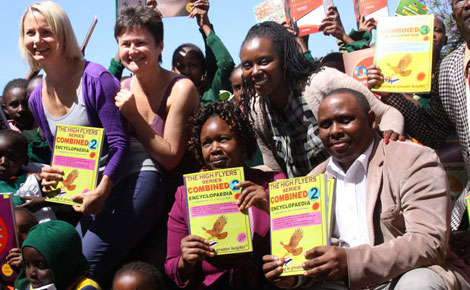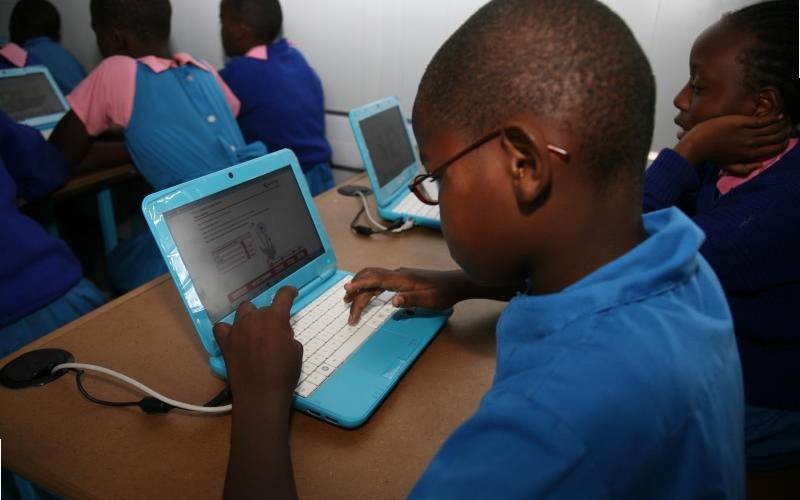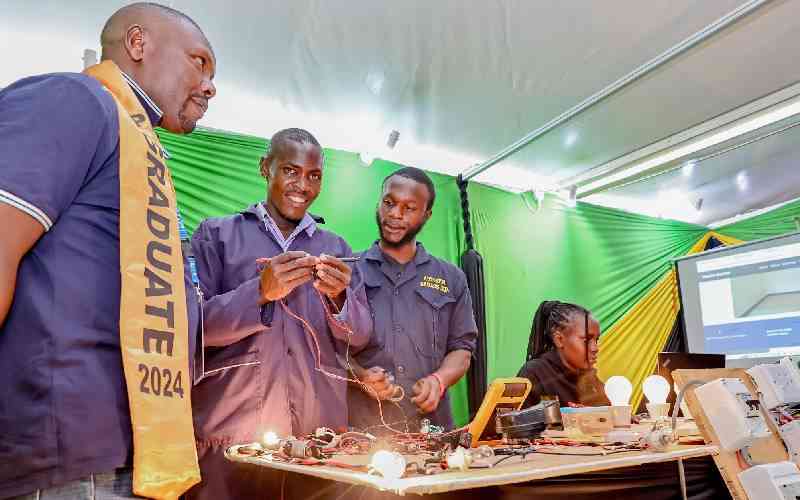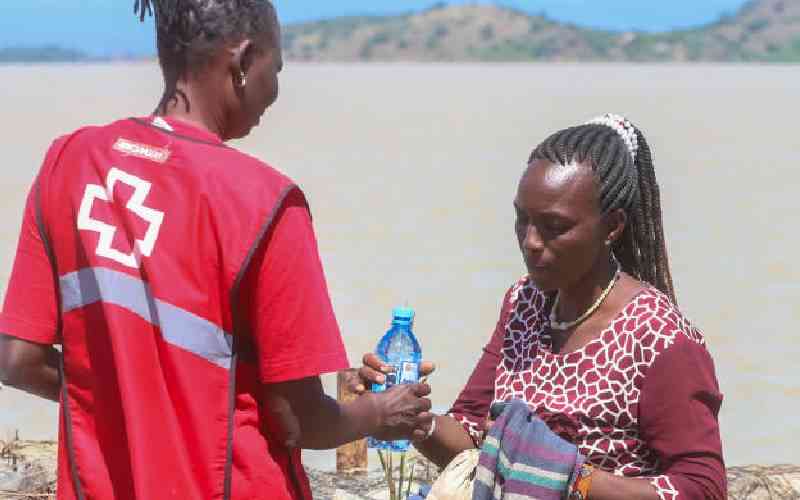 |
|
Rispah Wanjiru, a mother of two and one of the parents at Kanyenyaini Primary school,Muranga County shares her concerns over the dwindling number of pupils enrolling in the school . PHOTO DAVID NJAAGA |
Once the envy of many, the school is now desolate. Ms Jane Nyambura’s father was among the more than 2,000 pupils lucky to have a slot in this giant, but decades later, fate has brought her back to save Kanyenyaini Primary School from obscurity.
Shortly after taking office, Murang’a County Governor Mwangi wa Iria called on old boys and girls to salvage their former schools, most of which have lost their glory. Nyambura was one of the about 1,200 old pupils to volunteer as a mentor in the Murang’a Child Can programme, giving her services to Kibutha Primary Boarding School, which she attended from Class Three.
However, fate had other plans for her because as the list of the mentors was released by the Governor’s office, Nyambura’s name was listed under her village school, Kanyenyaini Primary in Kangema. She had attended this school in Class One and Two. It was as well, because Kanyenyaini needed a dose of inspiration. Sitting on 7.9-acre land, the school boasts of 32 classrooms and two halls, the largest in the area. However, only 11 of the classrooms are in use, with the rest standing dilapidated and abandoned.
 |
|
Murang’a County Assistant Commissioner Mary Wangari (centre) with TNA Deputy Secretary General Charles Waithaka (right) joins Kanyenyaini Primary school pupils in appreciating generous donation of computers and text books from Mars Drinks ambassadors from United Kingdom. PHOTO DAVID NJAAGA |
Founded in 1920, Kanyenyaini boasted of more than 2,000 pupils during his time. But today, the school has only 324 pupils. “For years, the school would have close to 150 pupils for KCPE. Compare this to this year’s 39 candidates,” says the head teacher Reverend James Gatere. Last year, the school registered a mean score of 229.12.
“The school used to perform well through to the 1990s,” says Nyambura, “but things have changed drastically.”
Indeed. Last Friday, the school hosted unique guests invited by Nyambura. They flew all the way from the US and UK, bearing books, toys and other educational materials. These were staff from Mars Drinks, a subsidiary of one of the most renowned US private companies, Mars Incorporated, now with operations around the globe.
Mars Drinks produces among other beverages, flavoured tea, with some of it sourced in the lush green Kanyenyaini, where tea farming is the economic mainstay. They have what they call Mars Ambassadors Programme (Map), where selected employees are sent to affiliate countries to make a difference to people they work with.
Now, Nyambura works for the Ethical Tea Partnership as the Programme Coordinator for Africa. ETP works to improve tea sustainability and the lives of tea workers and the environment.
“ETP also ensures the tea sector organisations are certified for best practices by Fairtrade, Rainforest and UTZ,” says Nyambura. But we go beyond that, ensuring there is no child labour, or discrimination in the sector.” A daughter of a tea farmer, Nyambura noticed a trend that explains the woes of Kanyenyaini Primary. Majority of the population comprises tea pickers.
“Most of these are women who did not go past primary school. It is their children who attend pu blic schools, most of which, unfortunately, lack in quality. This leads to a cycle of poverty.”
Indeed, the head teacher says that since 1990s, there arose academies and public boarding primary schools, where the bit well off, mostly small-holder farmers take their children. One of the alumni of the school, Kenneth Njema who sat KCPE in 1996, says some of his classmates did not go ahead to secondary school. “This has created an economic gap between the farmers and their workers, and also ‘single’ mothers whose husbands have refused to take responsibility.”
It is this inequality, and boardroom bureaucracy where tea corporations, and factories reluctance to help the small man inspired Nyambura to think out of the box. “I got in touch with the Map last year, and thankfully, they empathised with the plight of Kanyenyaini and committed to help.”
Ten Mars ambassadors helped plant trees, vegetable gardens and sugarcane around the school. The school adopted the green measures, so much so they won the inaugural Tea Directorate award for the Implementation of Climate Change Adaptation Measures.
Also, with Map, the best Standard Eight pupils in 2014 first term county exams, were bought mountain bikes to help navigate the hilly Kanyenyaini landscape besides motivating other pupils. “You find also, though most farmers homes have electricity, the tea pickers do not. So we bought solar lighting for the best four pupils in Standard Six to Eight.
But the buzz word in Nyambura’s industry is sustainability. Was her mentoring at Kanyenyaini Primary, rewarding the best few, sustainable?
Stay informed. Subscribe to our newsletter
“The children needed tools. Reading is a powerful tool that can leverage a poor child in alignment with the rich child.” Thankfully, the Map 2014 decided to carry on with the project. In a team spirit that has seen Mars Incorporated named number 76 of this year’s Fortune 100 Best Companies to work for, contributed about Sh900,000 (US$10,000).
From the kitty, the best boy and girl in this year’s KCPE will be sponsored through secondary school to the tune of Sh230,000 each. With the money, Juliana Saretta, the Supply Chain Vice President, Mars Drinks, led ten Mars Ambassadors to the chilly village on Friday, loaded with textbooks, storybooks, geometry sets and a computer.
Thrilled, one of the pupils, a ten-year-old, pointed at a wild animal in one of the charts, telling her friends in vernacular, “look at the buffalo!” The animal, however, was an elephant.
“I cannot thank Jane enough for letting us know about this school. We are so touched by their plight” said Saretta.
Some of the alumni of the school, led by Njema also donated books. With so many rooms empty, Nyambura hopes the school will convert one to a library this December holidays. Next year, she will raise funds for a boarding section from Class Six to Eight. The head teacher says some of the abandoned classrooms might be converted into a boarding section and/or a technical training institute.
 The Standard Group Plc is a
multi-media organization with investments in media platforms spanning newspaper
print operations, television, radio broadcasting, digital and online services. The
Standard Group is recognized as a leading multi-media house in Kenya with a key
influence in matters of national and international interest.
The Standard Group Plc is a
multi-media organization with investments in media platforms spanning newspaper
print operations, television, radio broadcasting, digital and online services. The
Standard Group is recognized as a leading multi-media house in Kenya with a key
influence in matters of national and international interest.
 The Standard Group Plc is a
multi-media organization with investments in media platforms spanning newspaper
print operations, television, radio broadcasting, digital and online services. The
Standard Group is recognized as a leading multi-media house in Kenya with a key
influence in matters of national and international interest.
The Standard Group Plc is a
multi-media organization with investments in media platforms spanning newspaper
print operations, television, radio broadcasting, digital and online services. The
Standard Group is recognized as a leading multi-media house in Kenya with a key
influence in matters of national and international interest.











